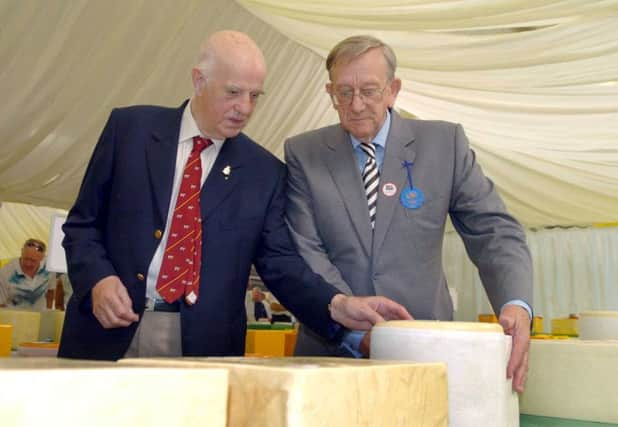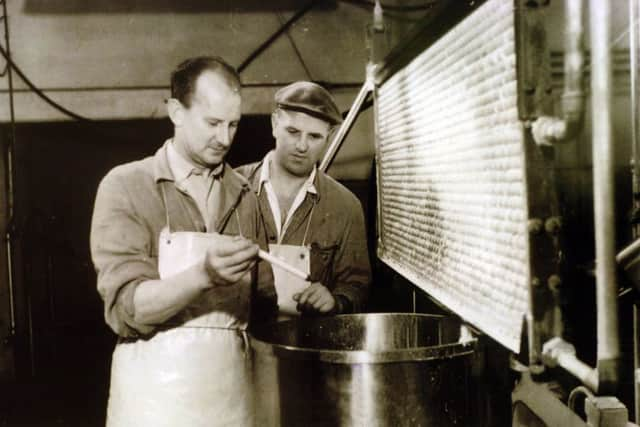Joseph Dickinson, farming pioneer


As a founder in 1948 of the nationally-known Longley Farm in Holmfirth, he pioneered such industry firsts as offering the region’s first pasteurised milk and setting up one of the first outlets selling fresh cream.
It was in 1954, when food rationing ended, that he had become among the first to return to producing cream, and in 1973 his dairy became the first in Europe to start making make cottage cheese on a commercial scale – and the first to sell it to the French.
Advertisement
Hide AdAdvertisement
Hide AdJoseph Dickinson was born into a world of farming and engineering. The family bottled milk from its tuberculosis-free cows in Shepley, south of Huddersfield, and operated a steam traction engine and threshing business.


Always practical, his early hobbies were model making and gardening. Latin left him cold and he ran from grammar school to become a Class 1 apprentice at Thomas Broadbent’s in Huddersfield, later known for making the X Craft Midget Submarine.
His 18th birthday fell on the first full day of the Second World War, and by 1941 he was working at Broadbent’s, studying at Huddersfield Technical College and fire-watching for the Home Guard on Castle Hill.
Although in a reserved occupation, he volunteered to join the Royal Navy in April that year, and saw action fire-fighting during the blitz of Plymouth. By 1943 he was promoted to Officer Cadet and squeezed three years’ engineering training into six months. The only course he failed was etiquette: something he never forgot and which reinforced his views on fairness and a dislike of snobbery.
Advertisement
Hide AdAdvertisement
Hide AdIn August 1944, he boarded HMS Lothian and within an hour was taking his first watch. Though he didn’t know it, the destination was Australia via Panama and the Lothian would be the headquarters ship for the British Pacific Fleet.


He remained with her through to demobilisation in September 1946 – a period that included a mutiny on board, the retaking of the Pacific islands from the Japanese and the repatriation of POWs from Shanghai.
As senior engineering officer and the youngest such lieutenant in the Navy, he slept only two nights ashore and knew the craft like the back of his hand – but he returned home a physical and mental wreck, weighing only eight-and-a-half stone and saying he did not think could have continued much longer. Nightmares about fire and men over the side never left him.
Post-war Britain was an economic mess and sailors from the Pacific campaign belonged to the forgotten fleet from a forgotten conflict. Joseph remarked that did not find the country a land fit for heroes and after five-and-a-half years in naval uniform, he joined the ranks of the unemployed. He would have emigrated to Australia, but for the 12 month waiting list for an assisted passage.
Advertisement
Hide AdAdvertisement
Hide AdInstead, fate played its hand. In February 1948, his great-uncle, Jonas Hinchliffe, willed to him and his brother Edgar, Longley Farm. It comprised a house, ten cows, a horse, thirty acres and a debt greater than the value of the farm – but it was a start.
The big opportunity came six years later. With dairy off the ration and cream-making started, the brothers found themselves running a booming business. There had been none on the market for 15 years and the product sold itself.
The farm was filmed twice for television, in 1960 and 1963. By that time Joseph and Edgar were seen as experts in upland farming, feeding silage to cattle and raising pigs on the by-produced skimmed milk.
There were other innovations to follow. In the late 1960s, Longley was an early pioneer in making yogurt, a staple almost unknown in Britain at the time. In 1973 it was the first to make fromage frais and crème fraîche.
Advertisement
Hide AdAdvertisement
Hide AdJoseph toured many Commonwealth countries as part of a group headed by the Duke of Edinburgh, was a guest at Downing Street, had dinner at Buckingham Palace, and advised the Government on agricultural policy. He also worked with Leeds and Glasgow Universities and was awarded the OBE for services to agriculture.
He and Edgar gave up dairy processing in 1996, the year he became president of the Jersey Cattle Society – Longley having now enlarged its herd of Jerseys to 300 – to concentrate on farming. He never retired and at 96, was working on detailed drawings of a new animal housing.
He remained at Longley Farm and his death came exactly 70 years after he had first moved there.
His wife, Ella, died five years ago and he is survived by their children, Jimmy and Sally, and by an extended family of grandchildren and great grandchildren.